
Ghulam Sughra (Urdu: غلام صغری; born March 2, 1970) [1] is a Pakistani activist. [2]

Ghulam Sughra (Urdu: غلام صغری; born March 2, 1970) [1] is a Pakistani activist. [2]
Sughra was forced into marriage when she was twelve years old, but six years later she became the first woman in her village to be divorced. [3] She was also beaten by her brothers when she tried to go to school, but she was able to study at home. She was her village’s first female high school graduate and the first teacher at its first school for girls. [4] She found that there were no girls to teach. Some of the reasons were cultural, but the main reason she thought was poverty so she endeavoured to find ways to alleviate the poverty. [3]
She was the founder and the CEO of the Marvi Rural Development Organization MRDO in Pakistan, which is an NGO whose mission is to create community savings funds and raise awareness of human rights, health, education, and social development issues. [2]
She became the first Pakistani woman to win Ashoka Fellowship in 1999 [5] and in 2011, she received International Women of Courage award. [2] [6] [7] from the former-US Secretary of State, Hillary Clinton and former First Lady Michelle Obama.
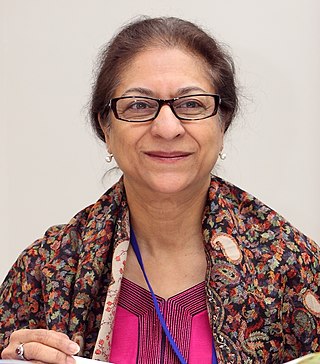
Asma Jilani Jahangir was a Pakistani human rights lawyer and social activist who co-founded and chaired the Human Rights Commission of Pakistan. Jahangir was known for playing a prominent role in the Lawyers' Movement and served as the United Nations Special Rapporteur on Freedom of Religion or Belief and as a trustee at the International Crisis Group.

Mukhtaran Bibi, now known as Mukhtār Mā'ī, is a Pakistani human rights activist from the village of Meerwala, located in the rural tehsil of Jatoi in the Muzaffargarh District of Punjab, Pakistan. In June 2002, Mā'ī was the victim of a gang-rape sanctioned by a tribal council of the local Mastoi Baloch clan, as a form of 'honour revenge'; the council ruling was a result of a dispute between the wealthier Mastoi Baloch and Mā'ī's Tatla clan.
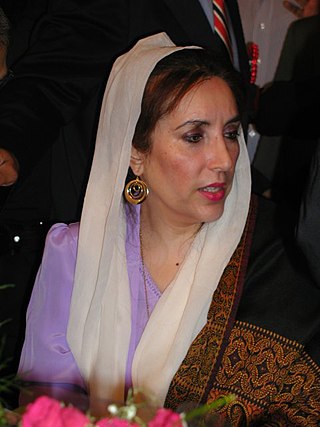
Women in Pakistan make up 48.76% of the population according to the 2017 census of Pakistan. Women in Pakistan have played an important role throughout Pakistan's history and they are allowed to vote in elections since 1956. In Pakistan, women have held high offices including that of the Prime Minister, Speaker of the National Assembly, Leader of the Opposition, as well as federal ministers, judges, and serving commissioned posts in the armed forces. Lieutenant General Nigar Johar, attaining the highest military post for a woman. Benazir Bhutto was sworn in as the first woman Prime Minister of Pakistan on 2 December 1988.
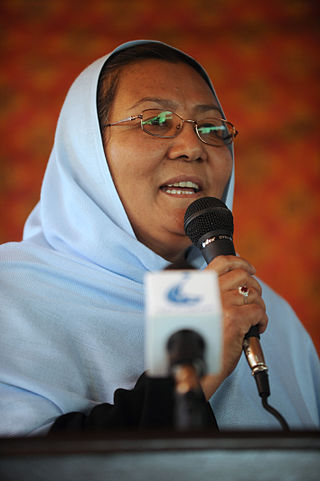
Dr. Habiba Sarābi is a hematologist, politician, and reformer of the reconstruction of Afghanistan after the Taliban first took power. In 2005, she was appointed as Governor of Bamyan Province - the first Afghan woman to become a provincial governor. She had served as Afghanistan's Minister of Women's Affairs and as Minister of Culture and Education. Sarabi was instrumental in promoting women's rights and representation and environmental issues. She belongs to the ethnic Hazara people of Afghanistan. Her last name is sometimes spelled Sarobi.

Melanne Verveer is the executive director of the Georgetown Institute for Women, Peace and Security at Georgetown University. She is a founding partner of Seneca Point Global, a worldwide women strategy firm, and a co-founder of Seneca Women. Melanne Verveer co-authored the book Fast Forward: How Women Can Achieve Power and Purpose with Kim Azzarelli.
Moeed Hasan Pirzada is a Pakistani-British political commentator, geostrategic analyst and television news journalist. He hosts a program on 92 News called 'Hard Talk'. He has interviewed many politicians from many different countries, and has written columns for national newspapers.

The International Women of Courage Award, also referred to as the U.S. Secretary of State's International Women of Courage Award, is an American award presented annually by the United States Department of State to women around the world who have shown leadership, courage, resourcefulness, and willingness to sacrifice for others, especially in promoting women's rights.

Marisela Morales Ibáñez is a Mexican lawyer who served as Attorney General of Mexico in 2011.
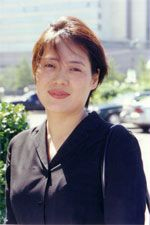
Guo Jianmei is a Chinese lawyer, human rights activist and director of a women's legal aid NGO. In 2005, she was one of 1000 women put forward as nominees for the Nobel Peace Prize. Guo is the recipient of the 2010 Simone De Beauvoir Prize and the International Women of Courage Award in 2011. She received the Right Livelihood Award in 2019. She is married to writer Liu Zhenyun.
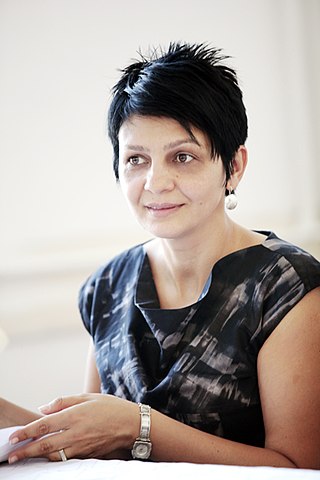
Ágnes Osztolykán is a Hungarian politician and Romani activist. She was a member of the National Assembly of Hungary for the LMP – Hungary's Green Party between 2010 and 2014.

Malala Yousafzai is a Pakistani female education activist and the 2014 Nobel Peace Prize laureate. Awarded when she was 17, she is the world's youngest Nobel Prize laureate, and the second Pakistani and the first Pashtun to receive a Nobel Prize. She is known for human rights advocacy, especially the education of women and children in her native homeland, Swat, where the Pakistani Taliban had at times banned girls from attending school. Her advocacy has grown into an international movement, and according to former Prime Minister Shahid Khaqan Abbasi, she has become Pakistan's "most prominent citizen."
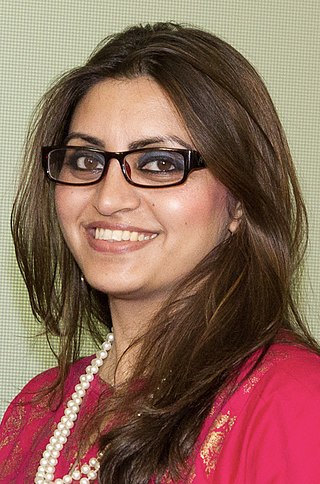
Gulalai Ismail is a Pashtun human rights activist from Khyber Pakhtunkhwa, Pakistan. She is the chairperson of Aware Girls, a global ambassador for Humanists International, and a leading member of the Pashtun Tahafuz Movement (PTM). She speaks on the subject of promoting peace and women's empowerment at conferences internationally, and is the recipient of the International Humanist of the Year Award, the Chirac Prize for Conflict Prevention, and the Anna Politkovskaya Award.

Begum Jan is a doctor and the founder of the Tribal Women Welfare Association, which educates tribal women in Northwest Pakistan about their rights, and gives them medical training. She grew up in South Waziristan, a conservative area of Pakistan, but her father encouraged her to become a doctor. She attended a school for boys as a child because there was no school for girls, and when her tribal elders forbid her to attend high school she studied with a tutor instead.
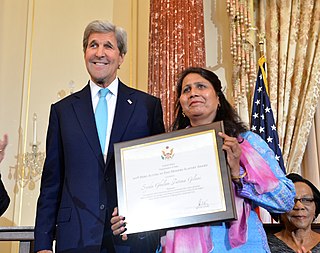
Syeda Ghulam Fatima is a Pakistani human and labour rights activist, known for her work in ending bonded labour in brick kilns, and is General Secretary of Lahore-based Bonded Labour Liberation Front Pakistan (BLLF).

Muniba Mazari Baloch is a Pakistani activist, anchor artist, model, singer and motivational speaker. She became the National Ambassador for UN Women Pakistan after being shortlisted in the 100 Inspirational Women of 2015 by BBC. She also made it to the Forbes 30 under 30 list for 2016.

Nighat Chaudhry was born on 24 February, in Lahore, Pakistan and moved to London with her parents when she was one year old. She is a trained Sufi & Mystique Kathak classical dancer. She started her journey from London and has been active as a professional Kathak dancer for over three decades. She studied ballet and contemporary dance. She met Nahid Siddiqui aged 14, regarded as one of the greatest Kathak dancers, and trained under her guidance. Inspired to learn the classical forms of her own culture, she abandoned ballet to understand and absorb the nuances of the style. This required her to be closer to its origins and she moved back to Pakistan.
Fatima Sughra Begum, garnered fame as a teenager, when at age 14 in 1947, she ripped down the Union Jack from the Lahore Civil Secretariat and replaced it with the All-India Muslim League flag.

Jalila Haider is a human rights attorney and political activist from Quetta in Balochistan, Pakistan. She is known to be the first woman lawyer from Quetta's Hazara minority, and an advocate for the rights of her persecuted community. She is a member of the Awami Workers Party (AWP), leader of the Balochistan chapter of Women Democratic Front (WDF), and also an activist in the Pashtun Tahafuz Movement (PTM). She founded a non-profit organisation, "We the Humans – Pakistan," which aims to empower local communities in Balochistan by strengthening opportunities for vulnerable women and children.
Thatta Ghulamka Dhiroka , known as Doll village of Pakistan, is a village in Okara District of Pakistani Punjab. It is situated 27 km from Okara city on the Faisalabad-Okara Road, 7 km from Bangala Gogera stop on Faisalabad-Okara Road. it is 91 km from Faisalabad International Airport 190 km from Province capital Lahore and 400 km from national capital Islamabad of Pakistan.